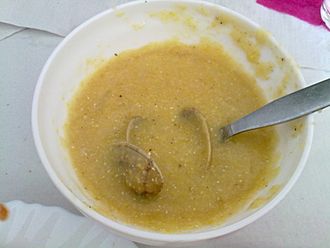Xarém facts for kids

Xarém (say "sha-REM") or xerém (say "she-REM") is a thick soup or porridge. It comes from the Algarve region in Portugal. People also enjoy it in Cape Verde and Brazil. This dish mainly uses corn flour, mixed with other traditional ingredients. These ingredients can change depending on where it's made. In the Algarve, it's often made with clams.
What's in a Name?
The words "xerém" and "xarém" have a bit of a mystery around where they came from. But there are two main ideas:
- Some people think the words come from an Arabic word, "zerem." This word means "grain potatoes."
- Another idea is that "xerém" might come from a Yoruba word, xe'ree. This word describes a rattle used in a special dance for a god named Orisha Shango.
Xarém in Brazil
Xarém is a popular traditional dish in the Northeast Region of Brazil. It's especially common in a state called Pernambuco. The Brazilian version of this dish uses corn kernels that are ground a bit coarsely. It's quite similar to a dish called polenta.
Xarém is also well-liked in Minas Gerais, another part of Brazil. Here, it's usually called "hominy" instead of xerém. This name refers to both the raw, broken corn and the cooked meals made from it. In Minas Gerais, hominy is often cooked with pork ribs. Sometimes, people add other meats like chicken, beef, or sausage.
Xarém in Cape Verde
In Cape Verde, xarém is a very important traditional dish. It's made with corn grain mixed with water, bay leaf, butter, and salt. Sometimes, people add fresh tuna, coconut milk, onions, and gindungo peppers to it.
There's a special kind called Xerém de festa. This version is made with fat, pork meat, and onions. Other times, it might include beans, bay leaf, peppers, and tomatoes. Xerém de festa is often served at big celebrations like wedding parties.
On the island of Brava, people celebrate a drum festival in June. During this festival, xarém is prepared and eaten while everyone dances to traditional music called coladeiras.
Xarém in Portugal
In Portugal, xarém is a traditional dish found in the southern Algarve region. It's very common in the city of Olhão. In Olhão, the dish is made with clams, bacon, and ham. Other ingredients that might be added include greaves (crispy bits of fried fat), pork, and grilled sardines.
A dish called "xarém with shells" was once a candidate for the 'Seven Wonders of Portuguese Cooking' award. This happened in September 2011, but it didn't win.
See also
 In Spanish: Xerém para niños
In Spanish: Xerém para niños
 | Sharif Bey |
 | Hale Woodruff |
 | Richmond Barthé |
 | Purvis Young |

